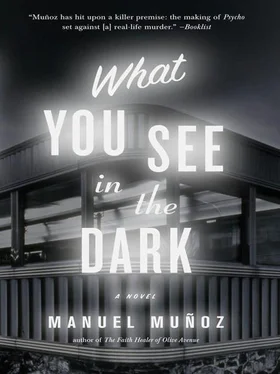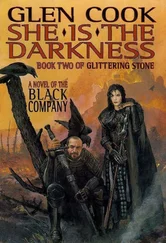The days kept going. She spread the news of the world on the café counter and watched the stories swallow up her hands, ink all over her fingertips. The light stung in the windows again, announcing spring, anticipating summer.
“Has anyone come to see you about your motel, Mrs. Watson?” Cal asked.
It was July. It was 1961. She looked up at Cal.
“You’ve been asking me that question for years, Cal.”
“The planning is over,” he said, pointing to the newspaper. “They’re building.”
She had known they were. She didn’t let on that she had stood on the edge of the motel parking lot, shading her eyes west. Past the fiery line of sunset, she could see nothing but empty space there, a horizon pulled taut. She didn’t know what she had expected to see — cranes, maybe, or the elevated ramps and thick pillars of highways like she had seen on television.
“Why would they come see me?”
“Are they anywhere close to your property? Could they buy you out?”
There hadn’t been much letup in her motel bookings. Sometimes weekends were slow, but that had always been the case. Still, from the banter of some of her more talkative customers, she knew the route was being built well west of her.
“I have no idea how close I’ll be to the highway.”
“It’s a freeway, not a highway,” said Vernon.
“Freeway or highway, what’s the difference?” she asked.
“We already have a highway,” said Vernon. “That’s the problem.” He sopped at his eggs over easy with a piece of bread and grabbed his silverware to demonstrate. “See these two lanes?” He placed the fork and knife next to each other. “They’re going in the same direction. There’s two other lanes right next to them going in the opposite direction. Just like the highway we have now.” He hovered his hand over the silverware, as if it were a car traveling. “Problem right now is that we run right through Bakersfield and Tulare and Kings-burg and so forth. The city traffic slows for all sorts of reasons. Stop signs or speed limits or cars pulling into motel parking lots.” Vernon motioned his hovering hand slowly to the right of the silverware. “With the new freeway, you don’t have none of that. Just a straight shot through. You get on by a ramp and you get off by a ramp. Easy breezy. No stop signs, nothing to slow the traffic down.”
“So?” she asked. “How’s that different?”
“Come on, Mrs. Watson,” said Cal. “Don’t tell me you can’t do the math. If I’m paying a trucker to get a load of eggs to Sacramento, do I want him there in five hours or seven? He could do five on the freeway because he never, ever has to stop or slow down. Unless he wants a cup of coffee.” He held out his cup. “That’s a different story.”
She poured, and Vernon finished with the silverware demonstration, taking them back up once again for his breakfast. “I hate to say it, but Cal was right all along. You should start thinking about selling that motel if you can.”
“No, Vernon, I can’t let that go.”
“Darlin’,” he said, putting down his utensils, “you’re just not going to have people stopping at the motel anymore. Not unless one of those ramps is close by.”
“People will still use the old Ninety-nine. Why wouldn’t they? You don’t just tear up a road that goes through town.”
“Arlene, you want to see it? You want to see the freeway with your own eyes?” Vernon asked. “What time do you get off shift today? I’ll drive you out there myself.”
“I get off at three.”
“I’ll be here.”
That afternoon, Vernon followed her to the motel. He drove a brand-new truck, sturdy and somehow elegant for its size and what he used it for. Vernon, she knew, was the kind of man who kept his possessions meticulously clean. She regretted that it was a Tuesday — the motel parking lot sat empty for lack of customers, and she hated for Vernon to see this. Arlene hurried from her vehicle with keys in hand, if only to keep Vernon from surveying the scene and saying something about her spotty business.
His truck was comfortable and the ride smooth. The air conditioner was on low, but the cab felt almost cold. “I’ve been watching them start on this thing for years. Just bit by bit. And they’ve got people working from here all the way up through Sacramento.”
“That’s good work, I guess,” Arlene said. “There’s always people looking for a job around here.” She looked out at the fields rolling by, and for the first time in a while, she thought of her older brother.
“I knew your husband, Frederick, a little bit,” said Vernon. He cleared his throat.
“How so?” She knew this but, surprised that Vernon had mentioned Frederick, put up a pretense.
“In town. You know how it is. Good people.”
The truck hummed along and Arlene waited for him to continue. She realized, too late, that she hadn’t said anything in agreement.
“I think he would’ve wanted you to sell that motel,” he said.
“He ain’t dead, Vernon,” she said. “He left me.”
“Arlene, he’d want you—”
“I could give a good goddamn what he would’ve wanted me to do.”
Vernon pursed his lips a bit. “What I mean … what’s best for you …” That didn’t sound right either and he stopped with a brief sigh. “It’s just a bad decision to hang on to that place, Arlene. Believe me. I’ve got property. You might end up with taxes on a place you can’t afford if the money stops flowing in. That’s all I’m saying.”
Up ahead, finally, she could see how the landscape had changed. Up ahead, she could see what it meant when Vernon said “ramp.” The road elevated in the distance.
“See that?” he said. “That’s the freeway.”
He slowed to a crawl and then turned the truck onto a dirt lane bordering a vineyard. The bumpy lane paralleled the new freeway, a deep ravine and fencing separating it from the site. Vernon guided the truck among the holes and the kicking dust and then finally stopped. “There it is.”
The two lanes shot north. The pavement seemed to glisten in the afternoon sun, a fresh gray, free of oil or grit, almost reflective in its newness. The lanes spanned wide, with generous shoulder room on either side, and even though Arlene could see enormous mounds of earth and gaps in the pavement only several feet away, it was clear that the freeway was a progression unimpeded. Up ahead, she could see the beginnings of a ramp and a completed overpass.
“Ah, that,” said Vernon. He eased the pickup truck along the dirt lane as far as the property line allowed, and Arlene could see why he had driven that distance. An enormous green sign loomed: union avenue.
“That’s the exit?”
“Straight into town,” said Vernon. “That means if someone takes that off-ramp and is looking for a place to sleep, your motel will already be behind them.”
The truck was still running, the air conditioner going at its low hum, still cold. Even so, Arlene could feel the sweat beginning to stick to the back of her waitress uniform. They sat in silence for a while, Vernon not turning off the truck.
Finally, Arlene shook her head slowly. “I wouldn’t know how to handle all that … paperwork … and … well …”
“You need to do it, though,” said Vernon, and he reached over and set his hand on top of hers. His hand was enormous and she could feel the calluses on his palms from his hard work. It was sweaty from having held the steering wheel. His hand did not move and neither did his fingers, and Arlene’s heart beat fast at his gesture. She waited for him to say something, maybe something about Frederick, what a fool he had been, but Vernon said nothing, and for a moment, Arlene wondered if his hand was nothing more than reassurance, that he recognized the gravity of her situation more than she did. When this thought crossed her mind, Arlene found herself oddly moved, and she felt tears coming, a knot in her throat. She swallowed hard to keep from crying.
Читать дальше












